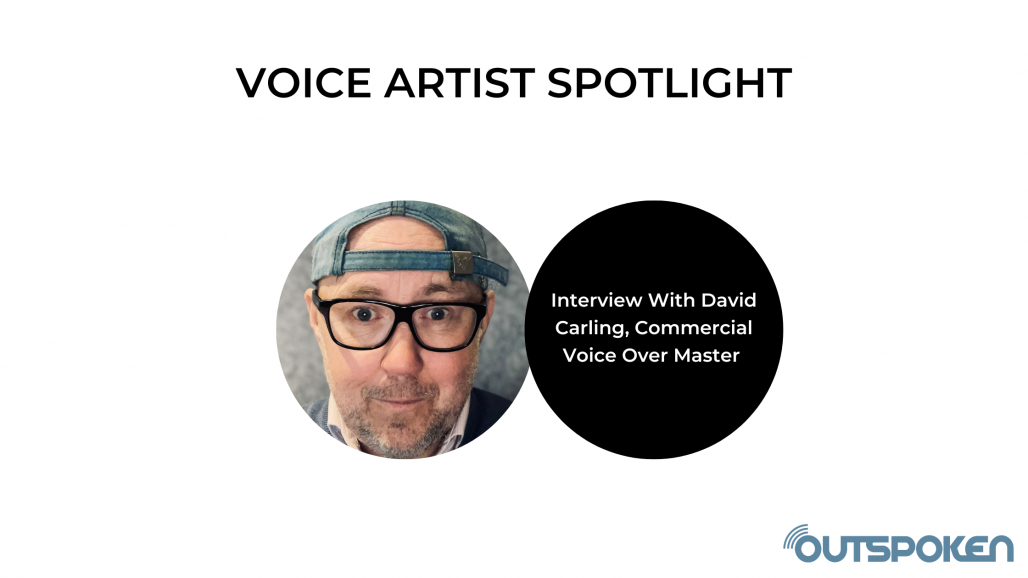Unlock the power of voiceovers in advertising by creating emotional connections that influence brand...
Voice Artist Spotlight - Interview With David Carling, Commercial Voice Over Master

In our Voice Artist Spotlight, we delve into the fascinating world of voice-over artistry through the experiences of David Carling, a hugely experienced voice artist who worked in every corner of the industry. With very successful career in the advertising sector, David offers an insider's perspective on the evolution of voice-over work, the challenges and triumphs of the work and the nuances that make a voice truly stand out.
This exclusive interview sheds light on the art of voice acting, providing invaluable insights for both aspiring artists and admirers of the voiceover profession. Join us as we explore David's journey, from his early days in the studio to becoming a renowned voice in advertisements worldwide.
1. Can you briefly introduce yourself and share how you first got started in the voiceover industry?
Hi I’m David Carling. My route into voiceovers is fairly traditional for its time. I trained as an actor at Mountview Theatre School London, one of the big five drama schools. Luckily, I went straight into work on West End and touring musicals, plays and the NewsRevue at the Canal Cafe Theatre, the longest running satirical show in London. I then worked with someone on the VO circuit, he knew someone setting up an agency, he thought I could do it. I did a tape, sent it in got picked up and 25 years later here we are.
2. How did you transition into specialising in commercial voiceovers?
I wouldn’t say I have “specialised’. I’m a jobbing actor and took the work that I was offered. I’m lucky because I’m one of those versatile voice artists who work across the board. However, I do think your agents want you to work in the more lucrative areas of the industry, or certainly did when I started. Therefore, I was pitched at that end first and luckily it worked out. I’ve done more commercial work than anything else.
3. How would you describe your unique vocal style, especially in the context of commercial voiceovers?
I can only go on what producers, sound designers and agents have told me, when they expressed an opinion about me in my presence. I promise I didn't ask them it was unbidden assessments.
Their comments are and were:
I’m the voice over that gets booked when you don’t know if you need or want a voice over as I will “always come up with something that works, if it’s there to be found.” This comes from being able to age up and down, be tonally deeper or lighter, have every accent solidly, so scripts can be workshopped. I have a naturally warm style which is a part of me that transfers into the reads.
I have the knack of selling without selling which I wasn’t aware of until it was pointed out to me. I’ve always approached voice overs as an actor’s character work. From the stuffiest of corporates to huge cartoon voices. So, I’m not ‘putting on a voice’ as sometimes you hear on TV commercials. It’s more that the copy is grounded to someone who’s real. Once you instantly create a character in session, which is dictated on the notes and everything you receive in session, you can then say the copy in a grounded natural truth. I guess the note that many of us have heard is “take the read out of it “ Well that’s how I get there. Being natural is what it boils down to, I guess.
I only give input when asked. I do the job quickly, I can speak advertising, which means that I am aware of what the brief means. I don’t become entrenched in a choice or suggestion that’s been given. I can ditch it and move another way quickly. I’m very easy to direct and am no trouble in studio. "You’re like a labrador that speaks, aren’t you Carling?". That last one is a direct quote from a producer !!!… and I don’t smell …..ish And I’m a moving target, meaning a lot of the time you wouldn't know it’s me on the ad which adds up to being able to do a large body of work. ☺
4. Do you have a signature tone or approach that sets you apart in the industry?
I started being an everyman who you trust… a friend and I still am, but I moved into doing every type of read from hard sell to no sell. Everyday products to luxury brands. Once you build up a body of work people trust you, not only the public and the client but the producers who want no fuss from a voice artist. I try to give people what they want, in an unfussy way and make suggestions only if asked. I’m happy to experiment. I’m not afraid of making a fool of myself, which I think is important.
5. Could you share some of your favourite commercial projects that you've worked on?
There’s been hundreds, I’ve been very lucky. Big brands I’ve voiced for on TV include:
Rice Krispies (snap and end line )
Sony
Red Bull
Adidas
BMW
KitKat
The Sun, Jaguar, Confused .com, Smarties, Walkers, Felix and Whiskers, Shreddies, Honey Nut, Weetabix, Weetaflakes, Dairylea, Capri Sun, Royal Mail, the Daily Mail, Peugeot, Monster Munch, Papa Johns, Iceland, Tesco, Specsavers, Olay, Iceland, M&S …etc etc . But what I really like is when you wouldn’t know it’s the same person on different ads running at the same time. Always a buzz doing different voices on an ad, then hearing about stuff you've been on, win awards… That’s all very cool.
I was also the voice on Change4Life, which was the most awarded, watched and successful public information ad campaign in the history. There was a big audition process and I was very lucky to get it. I worked with the best of the best on that, including Aardmen, whom I've worked with many times, which is always a thrill.
I genuinely love the work!
6. Walk us through your creative process when working on a commercial voiceover. How do you prepare for a new project?
I don’t prepare as such, I keep myself open to everything, directional notes given, the music on the ad the colour palate on the film, the copy, the grammar, the performance notes, tech notes from the engineer the atmosphere in the room… all of it.
7. Are there specific techniques or approaches you use to bring scripts to life?
As I mentioned earlier I approach all voice work as character work, I try and be open to everything, and use what I’m given to colour the work and align with the brand message and to what producers want. It’s crucial to make what you say, a complete truth. You go out to the piece; you don’t bring the piece to you. You always serve the copy. How you get there is a personal journey but that’s on the whole how I get there. It becomes instinctive, instant.
8. Are there specific aspects of the advertising sector that you find particularly rewarding or challenging?
The new direction of auditioning or self-taping for commercials is challenging. On one hand I understand this approach but on the other, I’m not sure it’s the right thing to do. It negates the value of casting people like agents. It renders your reels less effective and in short form it gives agencies free creative input, which I don’t think is fair. It’s especially true when auditioning for very short pieces, like 6 sec tag lines. However, I guess the only way to change it, is to stop auditioning, but then that’s you out of the game.
9. Can you highlight some key milestones in your career within the advertising sector?
Getting representation changed everything. It gave me access to the bigger campaigns. Thank you, Bernie Gaughan, she took a chance on me and gave me my career. Agencies like Another Tongue and Just Voices came next and I wouldn’t have gotten the chances I’ve had without them.
Placing a comma in the copy of my first big session for all the Vauxhall car range changed things a bit. The original copy that was tested for weeks, even months read “Handles life beautifully.” I read it ‘ Handles life, Beautifully”. It turns three words into two end lines. It changed the mood and meaning of the line and made the music choice work.… Adding that comma in a cheeky take, (always pop in a few that lean towards the way you hear it) opened up the industry for me a little. It changed the dynamic of the campaign as I simply said the line not as an endline but as part of a natural conversation. People started to trust the bloke on the Vauxhall ads and not think of him/me as perhaps a young, non-authority voice. Smarter more nuanced work followed. I gained everyone’s trust from bookers to audience.
10. What advice would you give to aspiring voice artists looking to make a mark in the advertising sector?
Always listen! Treat everyone with respect and kindness not just the people that can further your career. You’d be surprised how many people still don’t. Pull the ego back and serve the work… and listen to other artists, sound designers, producers, directors, account planners, creatives, clients, people on the bus… Just listen !!!!!!!!
11. Are there lessons from your own journey that you think would be beneficial for newcomers?
Don’t worry about making a fool of yourself. Just go for it if it feels right, or even if it doesn’t. Be uncomfortable …as Bowie said “your feet shouldn't quite be able to touch the bottom of the area you're swimming in.”
As we reflect on David Carling's insights, it becomes clear that his unique approach—selling without overt selling - is an art in itself. His ability to connect with listeners through genuine empathy and understated confidence has redefined what it means to be a voice-over artist in today's advertising industry. David's journey teaches us that authenticity can resonate more powerfully than the loudest pitch, and a natural, grounded delivery can leave a lasting impression that transcends the fleeting nature of commercials.
Wеbsitе Links:
Company Homepage: https://www.outspokеnvoicеs.com
Voicе Artist Sеrvicеs: https://www.outspokenvoices.com/voice
Newsletter
Stay up to date with news and special offers. Get to know our new actors and features
NEED HELP?
Visit Frequently Asked Questions page or send us a question.











.png)











Comment